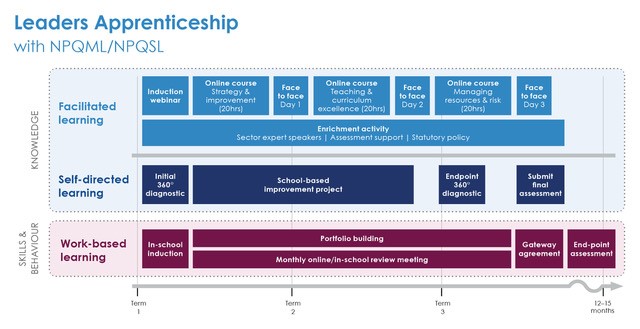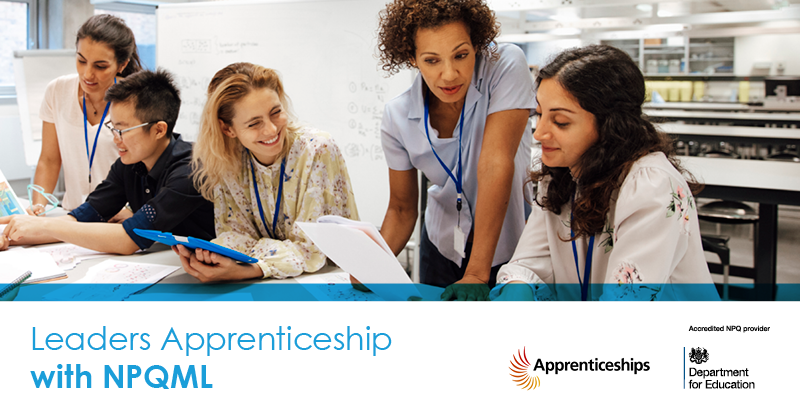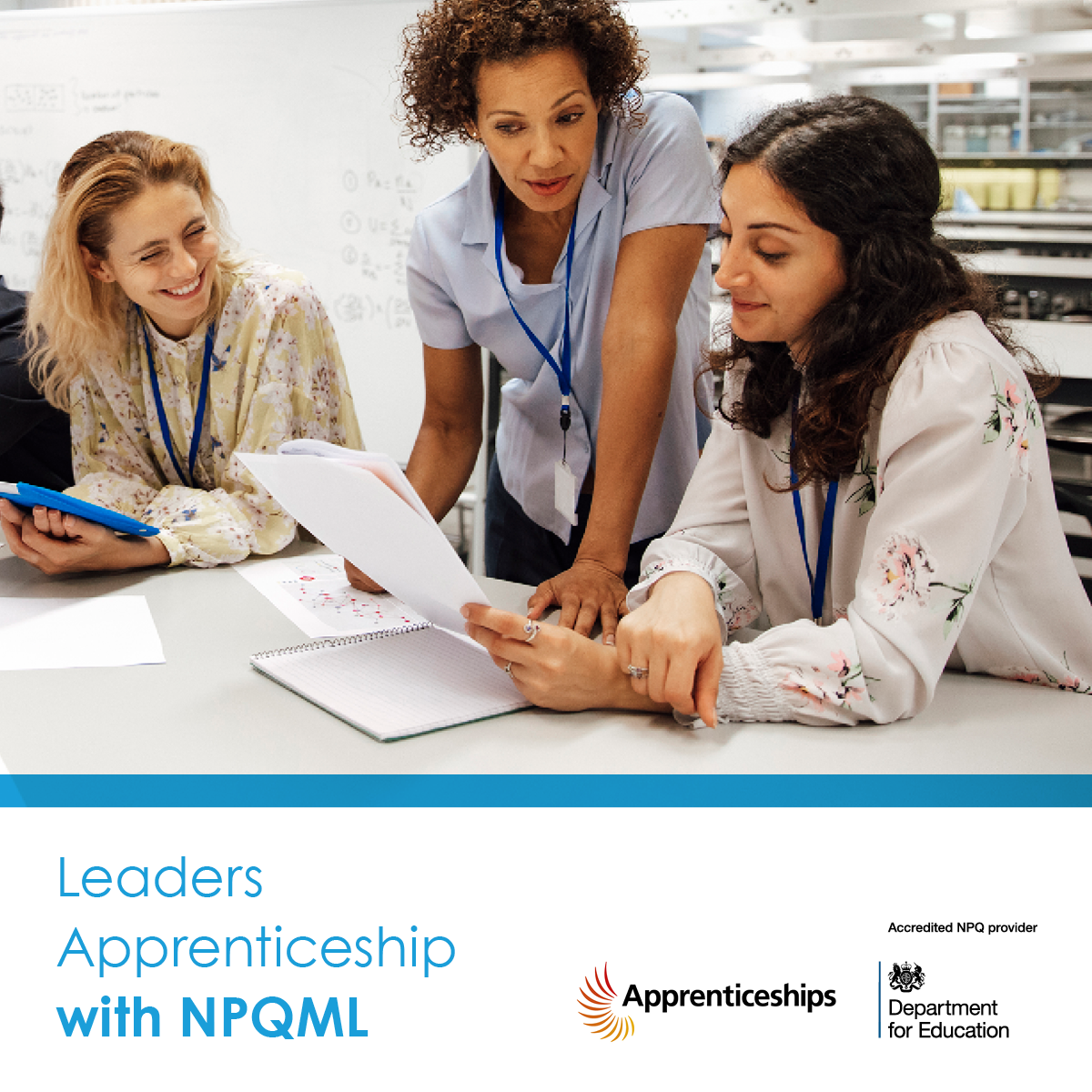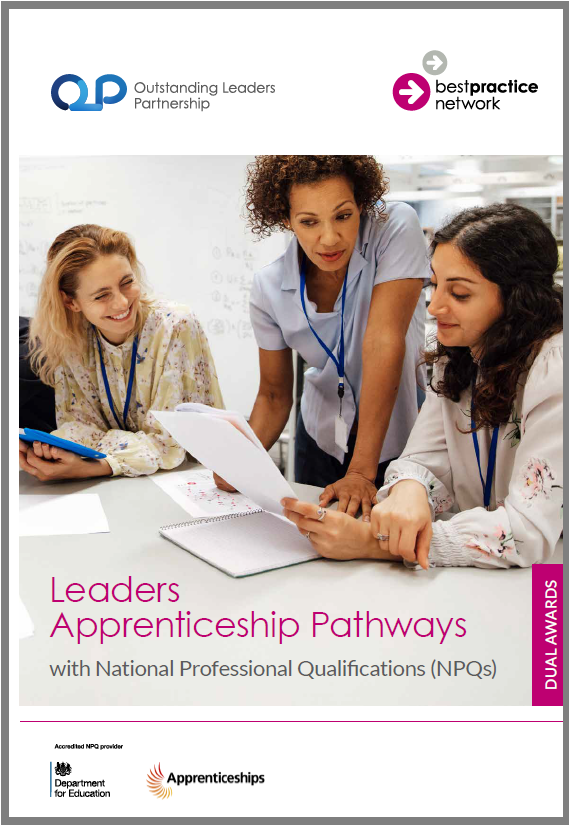Leaders Apprenticeship with NPQML
The Leaders Apprenticeship with NPQML programme has now been discontinued by the Department for Education. Please visit our Apprenticeships Page for more information about the Leaders Apprenticeships currently available
The Leaders Apprenticeship with NPQML has been designed for aspiring or recently appointed middle leaders looking to improve their leadership capability. The programme delivers the Department for Education’s leadership qualification NPQML with the comprehensive wraparound support of an apprenticeship. Candidates accepted on to the programme benefit from:
![]() Full National Professional Qualification for Middle Leadership
Full National Professional Qualification for Middle Leadership
![]() Completion of Level 5 Departmental Manager standard
Completion of Level 5 Departmental Manager standard
![]() Dedicated apprenticeship tutor and a separate personal NPQ tutor
Dedicated apprenticeship tutor and a separate personal NPQ tutor
![]() Up to 40 masters credits
Up to 40 masters credits
![]() Apprenticeship Levy funding
Apprenticeship Levy funding
Am I eligible?
Our dual award is for those who are or are aspiring to become, a middle leader with responsibility for leading a team such as a key stage leader, a curriculum leader, a pastoral services leader, a subject leader or head of a department.
Candidates must be able to evidence level 2 English and Maths prior to undertaking end-point assessment.
Where do I find further information about NPQML?
Our Middle Leader dual award includes the National Professional Qualification for Middle Leadership (NPQML). For more information about NPQML click here.
The Outstanding Leaders Partnership is the leading provider of NPQML nationally and the quality of our provision is rated ‘Exceptional’ by the DfE’s external quality assurance agent.
You can view our performance against the national metrics here.

Candidates completing the dual award benefit from:
- Increased awareness and understanding of self and of the behaviours needed to lead a team
- Increased capability and capacity to take on a leadership role
- Evidence-based sustainable school improvement activity improving pupil progress and team capability
- The ability to make informed decisions and approach new challenges in an effective and efficient manner
- The ability to review and evaluate practice in order to bring about change and get the best for young people and staff within the organisation
- One-to-one support from a dedicated personal tutor including monthly check-ins online & in-person
- Time set-aside from your working day to engage in learning
- Entitlement to an NUS student discount card
Programme outline
The following timeline shows the key points of engagement for a typical candidate undertaking the dual award.

We have carefully developed our dual award programme to be relevant to managers and aspiring managers working in the education sector. We have mapped the content of our NPQML or NPQSL qualifications so they are closely aligned to the knowledge and theory aspects of the apprenticeship standard. In addition, candidates will cover relevant skills and behaviours for the apprenticeship through work-based learning, building their confidence and supporting their career progression.
Delivery includes:
- Face-to-face activity delivered locally through our national network of partner schools
- Facilitated online courses working alongside peers nationally
- One-to-one support from a dedicated personal tutor
- Content individually tailored to the prior skills and knowledge of each candidate
- A variety of accompanying enrichment activities including podcasts, live webinars, reading, structured reflection, and project planning.
How do I access the funding?
You can access funding for the Apprenticeship component of this dual award from your school’s apprenticeship levy. Schools will be able to access the funding through their apprenticeship service (AS) account.
If your school needs help setting up your AS account, just let us know and we’ll guide you through it.
The level of funding depends on each candidate’s learning needs, with a maximum allocation of £7,000 to cover the cost of the apprenticeship. Note, there is an additional fee of £95 to cover the cost of the NPQML certification. This cannot be funded from the apprenticeship levy.
| School type | Accessing apprenticeship levy funding |
|---|---|
| Levy paying Academies and Trusts | Drawn down directly using your Apprenticeship Service account |
| Maintained schools (LA funded) | Drawn down by the Local Authority from levy fund |
| Non-levy paying schools | Education Skills Funding Agency (ESFA) will fund 95% of the course fee through the ‘co-investment’ scheme |
How do I apply?
Leaders apprenticeship applications for Spring 2021 are now closed. If you'd like to express an interest in joining our Autumn 2021 intake, please click the 'Express Interest' button in the right-hand column and complete the short form.
Leaders Apprenticeship with NPQML / NPQSL
An apprenticeship is a job with an integrated formal training program.
Apprenticeships are work-based training programmes that are designed to help employers and individuals train for specific job roles. Apprentices get a paying job with valuable training while working towards a nationally recognised apprenticeship standard.
Both new and existing staff may embark on an apprenticeship
Anyone in a job role who will benefit from substantial new learning to carry out the role.
An operations/departmental manager is someone who manages teams and/or projects, and achieving operational or departmental goals and objectives, as part of the delivery of the organisation’s strategy. They are accountable to a more senior manager or business owner. Working in the private, public or third sector and in all sizes of organisation, specific responsibilities and job titles will vary, but the knowledge, skills and behaviours needed will be the same.
Key responsibilities may include creating and delivering operational plans, managing projects, leading and managing teams, managing change, financial and resource management, talent management, coaching and mentoring.
Typical job titles may include:
For NPQSL- a deputy headteacher, a SEN coordinator, an assistant headteacher, or other senior staff member.
For NPQML- key stage leader, a curriculum leader, a pastoral services leader, a subject leader or head of a department.
No age restrictions
There are residency conditions:
https://www.gov.uk/guidance/apprenticeship-funding-rules-for-employer-providers/annex-a-eligibility-criteria-who-we-fund
5 GCSE’s at Grade C (4) or higher including English and maths or able to achieve Level 2 English and maths whilst on programme.
- Certificates or evidence on the PLR will be required for any exemption from sitting English and maths.
- Lost certificates – please contact your awarding body for copies
- If you have no evidence, we will support you to achieve Level 2 Functional skills
The apprentice is paid a lawful wage
The apprentice cannot contribute towards the cost of the apprenticeship
An initial assessment must consider whether the individual already possesses any of the training content e.g. the knowledge, skills and behaviours required by the apprenticeship:
- It is important to know the apprentice’s starting point so that the training plan does not duplicate prior learning.
- Any existing relevant qualifications will be checked against the Apprenticeship Standard criteria during the initial assessment to ensure there is no duplication.
- Significant new learning must be required.
Only knowledge, skills and behaviours in the Apprenticeship Standard are relevant, existing non-relevant qualifications at the same or higher level do not exempt learners from the programme, e.g. a degree in landscape design
https://www.instituteforapprenticeships.org/apprenticeship-standards/operations-departmental-manager/
Typically, 12 to 15 months
We are offering both NPQML and NPQSL as part of the same Level 5 Operations/Departmental Manager because:
The distinct nature of the NPQ’s will be appropriate for middle or senior leaders, however the occupations the apprenticeship has been written for is designed to be wide ranging, diverse and relevant to managers at different levels.
The Apprenticeship Standard states:
An operations/departmental manager is someone who manages teams and/or projects, and achieving operational or departmental goals and objectives, as part of the delivery of the organisations strategy. They are accountable to a more senior manager or business owner. Working in the private, public or third sector and in all sizes of organisation, specific responsibilities and job titles will vary, but the knowledge, skills and behaviours needed will be the same. Key responsibilities may include creating and delivering operational plans, managing projects, leading and managing teams, managing change, financial and resource management, talent management, coaching and mentoring. Roles may include: Operations Manager, Regional Manager, Divisional Manager, Department Manager and specialist managers
- Nationally recognised Level 5 Apprenticeship Standard accredited by industry regulatory bodies.
- The DfE accredited National professional Qualification (NPQs), NPQML or NPQSL.
- On completion, apprentices can register as full members with the Chartered Management Institute and/or the Institute of Leadership & Management, and those with 3 years of management experience can apply for Chartered Manager status through the CMI

The apprenticeship is a work-based qualification, which means that the majority of the training and assessment for the apprenticeship will be completed at your workplace. You will need to build an apprenticeship e-Portfolio of evidence. Your Apprenticeship Tutor will observe you in the workplace and guide you on which pieces of work-based evidence are suitable for your e-Portfolio.
Delivery will also be through webinars, online courses and briefings and three face to face training days offsite (dependant on current legislation).
Throughout your apprenticeship, you will have monthly remote visits and three-monthly face to face visits (dependant on current legislation) with your Apprenticeship Tutor to carry out reviews and observations and support you and your employer.
Once you have completed all the criteria for the apprenticeship and mock tests you will have a gateway meeting with your Tutor and Line Manager/Mentor to agree you are ready for your End Point Assessment (EPA). The EPA is completed to assess the knowledge, skills and behaviours that you have learnt throughout the apprenticeship.
- Multiple-choice online knowledge test
- Structured Competency-based interview (telephone, live media, online) – 15 minutes
- Assessment of online e-Portfolio of evidence
- Work-based project presentation with a Q&A – 15 minutes
- Professional discussion relating to continuing CPD – maximum 1 hour
If you are over 19 you must be paid at least the Apprenticeship Minimum Wage of £4.30 an hour, however many employers pay more than this and the average weekly wage is £200.
If you are 19 after completing the first year of your apprenticeship, you must be paid at least the full National Minimum Wage.
All apprentices are employed and have a contract of employment. You are counted as a regular employee so get all the benefits such as holiday and sick leave as well.
There are three levels of Apprenticeship:
Level 2: Intermediate Level Apprenticeship (equivalent to five A* GCSEs)
Level 3: Advanced Level Apprenticeship (equivalent to two A-Levels)
Level 4, 5 and 6: Higher Apprenticeship (Foundation degree level)
It is up to you what you do when you have finished your apprenticeship. There may be an opportunity to stay on at the same company and progress to the next level of apprenticeship or you may want to look for a new job or professional development opportunity.
Applying for an apprenticeship is like applying for a job so you will have to go through an application process.
Yes apprentices can move employers but they must check that the new employer is happy to support them on the programme and the employer will need to complete checks and contracts with us first.
https://www.gov.uk/government/publications/apprenticeships-off-the-job-training
- Off-the-job training is about upskilling an individual to reach full occupational competency, not accrediting their existing skills.
- Off-the-job training must make up at least 20% of the apprentice’s normal working hours (paid hours excluding overtime) over the planned duration of the apprenticeship.
- Off-the-job training must be away from the apprentice’s normal working duties and must teach new knowledge, skills and behaviours relevant to their specific apprenticeship.
.png)
- You can deliver off-the-job training in the apprentice’s normal workplace or at an external location.
- Progress reviews and on-programme assessment do not count towards 20% off-the-job training.
- Apprentices may choose to spend additional time training outside paid hours, but this must not be required to complete the apprenticeship.
- If training must, by exception, take place outside of the apprentice’s normal working hours, e.g. in an evening or at a weekend for an apprentice that normally works Monday to Friday between 9-5, we would expect this to be recognised, for example through time off in lieu or by an additional payment to the apprentice.
Benefits of OJT
Apprenticeships are about upskilling an individual. Reaching occupational competency takes time.
- Many employers and apprentices have praised the positive effect off-the-job training has on their productivity
- Apprentices feel valued by the significant investment in their training.
- It can be delivered flexibly, for example, as a part of each day, one day per week, one week out of five or as block release
- You may already have existing training programmes or materials you can use to deliver elements of the apprentice’s off-the-job training.
- We have developed a range of delivery styles to suit employer and apprentice needs. Employers should work with us to decide when and where off-the-job training should take place and who is best placed to deliver it.
- Learning support - To be successful, learners may need a range of approaches and support, which will be targeted appropriately. As well as material assistance, such as physical adjustments or access to accessibility software, some apprentices may benefit from additional time, revision or personal support from their training provider, to help them to stay on track and to achieve specific knowledge, skills and behaviours.
- Develops strategic leadership skills and behaviours
- Improves core management techniques
- Focused learning experience
- Builds leadership capabilities to motivate and inspire your teams
- Builds self-awareness
- Addresses real organisational issues
- For those that are engaged on an apprenticeship there may be an initial loss of productivity, due to the time the apprentice is engaged in training, but in the long term the new skills that the person brings back to the workplace, which makes them fully occupationally competent, should compensate for this.
- The importance of off-the-job training to a quality apprenticeship was emphasised in the Richard Review of Apprenticeships and more recently in Taking Training Seriously, a report by the Gatsby Foundation which compared English apprenticeships to those in other countries. This report reinforced the need for off-the-job training and concluded that 20% should be the bare minimum if England is to compete with the strongest apprenticeship programmes internationally.
- Ofsted and the Quality Assurance Agency for Higher Education (QAA) have also highlighted the importance of off-the-job training to a quality apprenticeship in their various publications.
- A key element of Ofsted’s inspection regime is a judgement about how well apprentices make progress from their starting points i.e. what an apprentice can do as a result of their training and experience on the apprenticeship programme that they were unable to do before.
OJT examples
- Research
- Networking events
- Seminars
- Shadowing others
- Employer induction programme, e.g. conflict resolution and corporate induction as these are part of the required knowledge.
- Reflective learning
- Self-directed distance learning (where the apprentice is working on their own with no real-time support)
- Interactive online learning (virtual classrooms where the learner can receive support, in real-time, from their training provider).
- Practical training
- Mentoring
- Time writing assignments
- Lectures, role-playing, simulation exercises
- Online learning
- Industry visits
- Learning support
- Dedicated Apprenticeship Tutor to support the apprentice and employer throughout the programme including regular reviews
- A small amount of additional knowledge (through formal learning and applied according to business environment)
- Support to gain and evidence more skills in the workplace acquired and demonstrated through continuous professional development.
- Support to develop behaviours in the workplace: taking responsibility, inclusivity, agility and professionalism
- Bringing learning together to build an e-Portfolio of evidence including a project
- End Point assessment
£7,000, but:
Apprenticeship funding is available for employers from the government. The size of the funding employers receive varies depending on whether they pay the apprenticeship levy or not. Non-levy paying companies currently pay 5% of the cost with the government paying the rest. For levy-paying employers, the funds are drawn from their levy accounts or topped up by the government if they have insufficient funds.
https://www.apprenticeships.gov.uk/employer/how-much-is-it-going-to-cost
- The entire apprenticeship is eligible for funding
- The apprentice cannot pay towards an apprenticeship
- Resits may incur extra costs to the employer
How are apprenticeships paid for and are they affordable?
Payments are spread across the entire lifetime of the apprenticeship - taken each month by your training provider. This means that you don’t have to meet the full cost of the apprenticeship at the start of the training. You just need enough funds in your account to meet the monthly payments. In addition, 20% of the cost of the apprenticeship will be held back and taken from your Apprenticeship Service (AS) online account at the end of the apprenticeship.
Do Levy funds run out?
Yes. Levy funds will expire 24 months after they enter your digital account unless you spend them on apprenticeship training. For example, funds that entered your account in July 2019 will expire in July 2021. If you don’t use them, you will lose them. The account works on a first-in, first-out basis. Whenever a payment is taken from your digital account it automatically uses the funds that entered your account first.
What happens if an employer’s Levy funds don’t cover the full cost of training?
If an employer pays the Apprenticeship Levy but their funds do not cover the full cost of the apprenticeship training, then additional support is available. The government will pay 95% of the additional costs (up to the maximum of the relevant funding band) -with you as the employer ‘co-investing’ 5%.
The following timeline shows the key points of engagement for a typical candidate undertaking the dual award.

Candidates undertaking the standalone NPQs are expected to complete three face-to-face events, three facilitated four-week online courses, project work, and regular support webinars.
In addition to the above, candidates completing the dual-award will receive further support to develop particular skills and behaviours relating to the apprenticeship standard. The additional support includes:
- Ongoing dedicated support from an apprenticeship tutor
- Quarterly school visit
- Monthly online review and support meetings
- Collation of an e-portfolio of learning
- Gateway meeting to assess readiness for endpoint assessment
- Endpoint assessment
NPQML Final Assessment
Leading an improvement project (4,500 words)
Candidates must lead an improvement project within their team, lasting at least two-terms, to a) improve pupil progress and attainment b) the capability of their team.
NPQSL Final Assessment
Leading an improvement project (5,000 words)
Candidates must lead an improvement project across their school, lasting at least two terms, to a) reduce variation in pupil progress and attainment and b) improve the efficiency and effectiveness of teaching.
Level 5 Apprenticeship (End Point Assessment)
- Professional discussion, underpinned by a portfolio of evidence
- Project proposal, presentation and questioning
The majority of the apprenticeship training takes place in your workplace. Face-to-face training events will fall alongside our stand-alone NPQ courses ensuring a wider availability of local groups.
Delivery venues are largely provided through our national network of teaching school and multi-academy trust partners. Candidates applying from one of our partner groups will be allocated to that group for face-to-face events.*
In addition to partner groups, we also have a number of groups located according to the geography of the candidates that register, helping minimise travel time for the majority of candidates.
Candidates not registering through a school partner will be allocated to their most geographically convenient group for the three training events.
Our face-to-face groups take place across the country and we strive to ensure all candidates have access to local delivery.
You can view a map of our most recent groups locations here: www.outstandingleaders.org/npq-groups
* Subject to group viability
The levy is paid by large employers with a wage bill of over £3 million. These employers pay 0.5% of their total annual pay bill into the levy. Most state-maintained schools and multi-academy trusts pay into the levy.
The levy is designed to create long term sustainable funding for apprenticeships and to give employers more control to provide their staff with a range of training opportunities.
If your school is non-levy payer or has exhausted its levy funds then you can still access a funded apprenticeship. Please contact us if you would like more information
| School type | Accessing Funding |
|---|---|
| Levy paying Academies and Trusts | Drawn down directly using your Apprenticeship Service account |
| Maintained schools (LA funded) | Drawn down by the Local Authority from levy fund |
| Non-levy paying schools | Education Skills Funding Agency (ESFA) will fund 95% of the course fee through the ‘co-investment’ scheme |
The government have issued the following videos around the apprenticeship service:
Using the apprenticeship service
Employers: How to create an account and accept the employer agreement on the apprenticeship service
Covid-19: Leaders Apprenticeship with NPQML / NPQSL
Transcript of the presentation and any additional notes are acceptable. For example, a PowerPoint presentation and additional notes to be used at the meeting.
Yes, they can submit the project they have done. The data they use can be internal school data. We would advise that in this case the analysis of data for these pupils in the project is based on the August 2020 GCSE results. They need to include a statement regarding the school closure and date that it took effect due to COVID-19. Where this is the case, the assessor needs to be made aware of this so as not to penalise the participant.
Yes, they can submit the project they have done. The data they use can be internal school data. We would advise that in this case the analysis of data for these pupils in the project is based on the August 2020 GCSE results. They need to include a statement regarding the school closure and date that it took effect due to COVID-19. Where this is the case, the assessor needs to be made aware of this so as not to penalise the participant.
Yes.
This is not confirmed yet given the current situation. The DfE will inform providers on the date that this will return to 18 months.
This will be approved on a case by case basis.
For example, if they have completed two terms and have issues accessing versus if someone has completed only 1 term?
All participants who started the programme in June 2018 have been given an additional 6 months to complete the project by the DfE.
Yes
Yes
Yes.
Yes.



 of Untitled design-Max-Quality (1).jpg)
 of Untitled design-Max-Quality (2).jpg)
.png)
